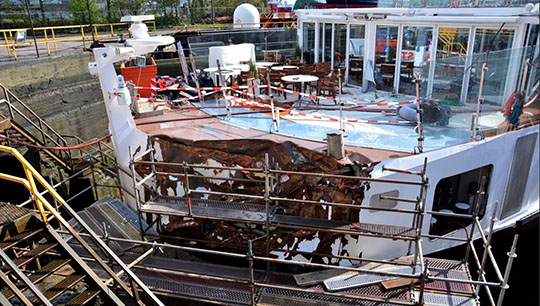Dutch safety board calls for clampdown on river cruise safety following Western Scheldt collision
6 January 2021

Nautilus International is backing demands from Dutch safety experts for a far-reaching clampdown on the operating standards of river cruise vessels.
The calls follow an incident in which the Swiss cruise vessel Viking Idun collided with a Maltese-flagged chemical tanker just after midnight on 1 April 2019. Both Viking Idun and the tanker, Chemical Marketer, suffered 'severe' damage in the incident, which occurred in the Western Scheldt.
Some of the 171 mainly elderly passengers onboard Viking Idun suffered minor injuries as a result of the impact.
A hole more than 8m long was torn in the side of the 14,298dwt tanker – which was carrying a cargo of benzene, heptane and methanol – but its double skin prevented a spillage.
The Dutch Safety Board said its investigation into the accident had shown that it was not an isolated incident and had uncovered questions about the safety culture onboard river cruise vessels, including the competency of their crews.
Investigators found that there were six different nationalities among the Viking Idun's seven nautical crew and their inadequate command of the English language meant that VHF marine radio communications were poorly understood. The cruise vessel's bridge team were probably confused by conversations between the tanker and traffic control over proposed 'red-to-red' passing arrangements, the report notes, and this resulted in a collision becoming inevitable.
The Serbian captain and Ukrainian first mate did not have sufficient knowledge and experience of the Western Scheldt to safely navigate the 'complex' area at night. The crew had also failed to report that Viking Idun had run aground a few hours before the collision as it attempted to make room for a passing car carrier in the waterway.
The Dutch Safety Board warned that the growing popularity of river cruises 'demands additional emphasis on safety' and the report notes the lack of structured international inspection arrangements for river cruise vessels. It urges the ministry of infrastructure and water management to improve the effectiveness and coordination of the supervision of river cruise ships, to more effectively enforce working language requirements, and to ensure that accidents are fully investigated, and the lessons learned are shared with international partners.
Competency requirements for crew members in the Scheldt area should be tightened, it said. 'The Western Scheldt is one of the most heavily used areas of water in the world, where inland navigation traffic, sea shipping and recreational shipping come together, day and night. This intensive traffic, combined with narrow navigation channels, shallows, strong currents and tidal effects make this a high-risk navigation zone.'
The report also calls for Viking River Cruises and other operators to ensure that a fully qualified and competent nautical crew is always present on the bridge and that they should develop, implement and enforce customised training programmes with an emphasis on the command of languages, including nautical English, and sufficient local knowledge of the proposed routes.
Nautilus International deputy general secretary Marcel van den Broek backed the findings of the report and said its recommendations made good sense. 'The river cruise industry has grown very rapidly in recent years and there are some very worrying aspects to this,' he added. 'This was just one of a series of serious incidents, and it raises questions about whether the fleet expansion has been too rapid.
'The cruise vessels are difficult to manoeuvre and if you don't have the correct knowledge of these dangerous and congested waters, there are so many things that can go wrong.'
Tags
